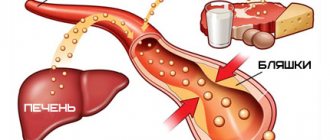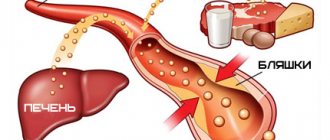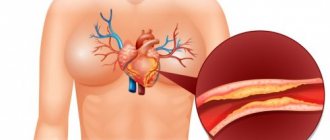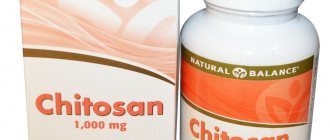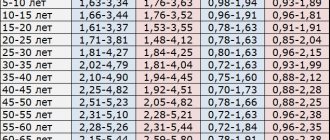Lipid metabolism disorders contribute to the development of cardiovascular diseases. For example, the production of large amounts of exogenous cholesterol leads to atherosclerosis. You can regulate its synthesis in the blood not only with the help of medications, but also with natural remedies. Flaxseed oil has been used for decades to lower cholesterol and has repeatedly proven its effectiveness.
Today it occupies a leading position among other medicinal plant products. Its components normalize blood composition, make blood vessels more elastic, reduce LDL (lipoprotein) levels, and improve metabolism. Flax seed oil is rich in polyunsaturated acids and valuable elements for the human body, which prevent the occurrence of a number of pathologies.
Indications for use
Doctors recommend consumption of this oily product in the following cases:
- for the prevention of vascular diseases;
- in the complex treatment of strokes and heart attacks, coronary heart disease;
- to prevent blood clots;
- to reduce the concentration of triglycerides and cholesterol (a combination of fatty acids and trihydric alcohol glycerol);
- for hypertension;
- for preventive purposes against malignant neoplasms.
Benefits of flaxseed oil
Thanks to its composition, flax has a positive effect on the functioning of all systems of the human body. It consists of essential fatty acids, which are not synthesized by internal organs, but enter the blood only from the outside. The herbal remedy contains:
- Omega-3 (linolenic);
- Omega-6 (alpha-linoleic);
- Omega-9 (oleic acid).
These components help reduce bad cholesterol levels without affecting the production of nutrients and improving their metabolism. They are converted into high-density cholesterol and remove excess fat. At the same time, cell permeability is maintained to receive the necessary nutrition, and the vessels become stronger and more elastic. Thus, the risk of plaque formation is minimal.
The healing composition of flaxseed oil also includes vitamins (A, K, E, B6, F, C) and minerals (magnesium, zinc, phosphorus).
How does cholesterol lowering happen?
Polyunsaturated fatty acids accelerate the breakdown of cholesterol, reducing low-density lipoprotein (LDL) levels by about 25%.
At the same time, the production of healthy fats for the body only increases, and the number of plaques in the blood vessels decreases.
Prevention of atherosclerosis
Cholesterol is part of the cell membrane. He participates in all vital processes. However, its excess in the blood leads to serious consequences: narrowing of the lumen of the arteries, the formation of stenosis (complete or partial closure), and, as a result, circulatory disorders. This primarily affects the heart and brain.
Blockage of blood vessels indicates the beginning of the development of atherosclerosis. The cause of the disease is considered to be an imbalance between high and low density lipoproteins, leading to the formation of numerous plaques. In such cases, the use of flaxseed oil for high cholesterol is welcome. It helps fight the disease and is an excellent addition to the main therapy.
For preventive purposes, the herbal remedy can be consumed 1 tbsp. l. every day after breakfast for a month. Its healing properties will reduce the synthesis of bad cholesterol and help remove excess cholesterol from the bloodstream.
Cleansing blood vessels
Flax seed oil has also found its use in cases of increased blood clotting, and it also prevents the formation of blood clots. This effect has a positive effect on the condition of capillaries and protects a person from heart attacks and strokes. In addition, the components of the product reduce the inflammatory process in the arteries, increasing their resistance to high pressure levels of hypertension.
For diabetes mellitus, the oily product normalizes glucose levels. The disease affects blood vessels and is a favorable factor for the development of atherosclerosis. Often, insulin-dependent people suffer from vascular blockage, as impaired metabolism leads to damage to the internal epithelium of the arteries.
As a result of this pathology, the permeability of the vascular wall becomes better, and conditions are created for the formation of plaques with high cholesterol. The unique properties of flaxseed oil prevent cholesterol oxidation, protecting arteries from stenosis.
The plant product improves the metabolism of carbohydrates and fats, prevents clogging of blood vessels, and increases the level of lecithin, which reduces the risk of cholesterol plaque deposits.
Statins and flax seed oil
With high cholesterol, doctors can prescribe special medications to the patient that block the production of fat. These medications include statins. They reduce the synthesis of bad cholesterol and increase the amount of HDL (high density lipoprotein). These compounds, consisting of lipids and proteins, ensure the processing and removal of harmful fats from the vascular bed back to the liver.
Thus, the arteries are protected from the formation of cholesterol plaques. However, taking these medications is usually associated with numerous side effects. During treatment, patients may experience: problems with the gastrointestinal tract, pathological processes in the muscles, dizziness and nausea.
In such cases, many people think about replacing statins with folk remedies. In advanced situations, there will be little benefit from flaxseed oil for the heart and blood vessels. Reducing high cholesterol levels will require medication, and herbal products are seen as a good addition to therapy.
This is why herbal medicine will not replace the use of statins. It is effective for prevention and at an early stage of the disease.
Nutrition for high cholesterol
What is cholesterol? Cholesterol is a lipid that is used to build all cells in the body. It is necessary for the normal functioning of the nervous and immune systems, for the production of vitamin D, a number of female and male sex hormones. Hence the conclusion - the body needs cholesterol! The only question is its quantity.
Normal blood cholesterol is considered to be a level of up to 5 mmol/l. And if there is more cholesterol, it settles on the walls of the vessel and leads to the formation of atherosclerotic plaques. And, as you know, vascular atherosclerosis is the cause of coronary heart disease, cerebrovascular disease, heart attacks, strokes and many other diseases.
Cholesterol is a very heterogeneous substance. Its two components are most important:
1. High-density lipoprotein (HDL) or “good” cholesterol. These molecules do not settle on the walls of the vessel and, on the contrary, help clean them. The more HDL, the better. The normal HDL level for women is above 1 mmol/L, and for men it is above 1.2 mmol/L.
2. Low-density lipoproteins (LDL) or “bad” cholesterol. It is this fraction of cholesterol that leads to the formation of atherosclerotic plaques. This increases the risk of heart attack or ischemic stroke, as well as other cardiovascular complications. The normal LDL level in women is less than 2.5 mmol/l, in men it is less than 2 mmol/l.
Thus, it is important for a person to increase only one fraction of cholesterol, namely LDL. Factors that increase the level of “bad” cholesterol include:
- smoking;
- overweight;
- binge eating;
- lack of physical activity;
- poor nutrition
- disruption of the gastrointestinal tract
- some endocrine disorders;
- hereditary predisposition.
Many people believe that we get cholesterol from food. This is not entirely true. Most of the cholesterol - about 80% - is produced by the body itself, primarily by the liver. You can reduce the level of cholesterol produced by following simple rules of a healthy lifestyle:
1. Normalize body weight
2. Quit smoking
3. Move more!
4. Monitor and treat diseases of the gastrointestinal tract and endocrine disorders during treatment.
A person gets 20% of cholesterol from food. It is this 20% that can be “removed” with proper nutrition.
If these methods do not help normalize cholesterol, then medications take over. Your doctor will prescribe them for you.
The peculiarity of a diet for lowering cholesterol is that it excludes foods containing large amounts of it. Cholesterol is primarily found in animal fats. These fats are “saturated.” At the same time, many vegetable fats and sea fish oil are “unsaturated” and, on the contrary, help reduce cholesterol. When cooking, you should avoid fried foods. It is better to boil, stew, bake and grill. Immediately before cooking, trim off all excess fat from the meat and remove the skin from chicken meat. During the cholesterol-lowering diet, eat 5 times a day, approximately every 3-4 hours.
Now in more detail about each product group.
1. Meat and poultry. Meats such as pork or lamb contain a lot of fat, and therefore cholesterol. Try not to buy fatty brisket, neck, tenderloin, ribs and other cuts of carcass that contain a large amount of fat. Remember that fat is not just lard that can be seen. There is also the so-called “hidden fat”, which is even found in pork fillet. There is also a lot of cholesterol in fatty poultry - goose or duck. Give preference to meats that contain little hidden fat and lard, namely lean beef, chicken (especially chicken breast) and skinless turkey.
2. By-products. Foods containing large amounts of cholesterol are liver, kidneys, lungs, tongue and brains. Limit their consumption as much as possible.
3. Semi-finished meat products. The content of saturated fats and cholesterol in processed meats is increased: ham, sausages, sausages, canned meats and smoked meats. Even boiled sausage without lard contains hidden fats. In addition, these foods contain too much salt.
4. Fish and seafood. Seafood such as fish caviar, sprats, fatty river fish, squid and octopus contain large amounts of cholesterol. Such products may be present in your daily diet, but it is recommended to limit their consumption to a minimum. Give preference to lean fish. It is very useful to eat fatty sea fish, as it contains omega-3-polyunsaturated fatty acids, which help reduce the formation of atherosclerotic plaques.
5. Oils. The worst source of fat is margarine. Remember that it is found in baked goods and fast food. It is better to use vegetable oils, especially olive, sunflower, and flaxseed. It contains polyunsaturated fatty acids and helps lower cholesterol.
6. Milk and dairy products. Cholesterol is contained in those dairy products that have a high percentage of fat content: full-fat cottage cheese, sour cream, cheese, butter. Give preference to low-fat dairy products: kefir and milk (low-fat or with less than 1% fat content), yogurt, sour cream only for dressing 10%, low-fat cottage cheese, cheese with a fat content of less than 30% in small quantities.
7. Eggs. It is recommended to consume no more than 3 eggs per week. But if you separate the yolk, then the whites can be freely eaten in unlimited quantities.
8. Fruits and vegetables. They are very helpful! Pay special attention to apples, carrots, beets, citrus fruits, peppers, pumpkins, eggplants, quinces, cherries, plums, and pears. Pectin in their composition envelops cholesterol and removes it from the body. Onions, garlic, broccoli and berries also contain similar cholesterol-fighting compounds. There is a rule of thumb: 5 servings of vegetables and fruits per day. One serving is
- one apple, orange, pear or banana;
- 2-3 tablespoons of freshly prepared salad or canned fruits;
- 1 tbsp. l. dried fruits, 2 tbsp. l. dishes made from freshly frozen vegetables or fruits.
9. Confectionery. The lion's share of cholesterol enters the human body through industrial baked goods and desserts. These products contain trans fats (margarine) as well as high amounts of saturated fat. In addition, they always contain a lot of sugar, which is known to promote atherosclerosis.
10. Bread and pasta. Wholemeal bread and durum wheat pasta are an excellent source of energy. They contain insoluble plant fibers that bind cholesterol in the intestines and remove them from the body.
11. Legumes (soybeans, beans, peas). Contains a lot of vegetable protein. Definitely recommended in a diet with a small amount of meat.
12. Drinks. Brewed coffee has been shown to increase blood cholesterol because fats are released from the coffee bean during brewing. There is also evidence that completely giving up coffee leads to a decrease in blood cholesterol by 17%. Tea contains flavonoids. They are believed to help lower cholesterol.
13. Nuts. They contain a large amount of calories, vegetable protein, and unsaturated fatty acids. Recent research suggests that regular consumption of certain types of nuts, such as walnuts and almonds, leads to moderate reductions in cholesterol.
And a few more words. Read the product ingredients carefully. High fat and calorie content indicates that the package contains food that may contain too much cholesterol.
We wish you good health!
Admission rules
Using flaxseed oil to reduce cholesterol and cleanse blood vessels is easy.
The main thing is to do it correctly and regularly, then a positive result will be ensured.
How to drink according to the plan
At the beginning of treatment, doctors recommend taking a small amount of the herbal product and gradually increasing the dosage. During therapy with flaxseed oil, the patient must listen to his body and record the slightest health problems that may arise. Before using this product to cleanse blood vessels and remove cholesterol, you must consult a specialist (therapist, cardiologist).
It is best to drink flax seed oil on an empty stomach; in such conditions, its digestibility increases, especially when the stomach produces excess hydrochloric acid. The preventive norm is determined by 1 tbsp. l. once a day half an hour before meals. The therapeutic dose for people suffering from vascular and heart diseases consists of two tbsp. l. per day: morning and evening.
The product can be washed down with warm water or eaten with a slice of bread. After consuming flaxseed oil, you should not eat lemon or other citrus fruits, as they contain acid that reacts with fats, reducing the therapeutic effect. When the patient has missed an evening dose of a herbal product, it can be drunk at night an hour after dinner.
If everything is done according to the instructions, then after 5-7 days there is a decrease in the level of bad cholesterol and an improvement in blood composition.
How long to take
The product helps when it is used regularly and for a long time. With a one-time or infrequent intake of flaxseed oil, a positive result cannot be achieved. You shouldn't expect an immediate reduction in cholesterol. In order to achieve a therapeutic effect, a sufficient accumulation of valuable substances in the body is necessary.
For preventive purposes, doctors prescribe drinking the oily product for a month, then recommend taking a three-week break. In case of severe vascular pathology and high cholesterol, the oil is prescribed as an addition to the main therapy. It should be taken for 35 days. The duration of treatment and the exact dosage are determined by the doctor, who must take into account the patient’s age, weight and concomitant diseases.
People who adhere to the rules of a healthy diet can consume flaxseed oil constantly, adding it to non-hot dishes. It not only has a positive effect on the condition of blood vessels, but is also simply delicious.
The main thing is not to exceed the daily norm and not to fry it.
Summary
Flaxseed oil does not have the same nutritional value as whole flax seeds. However, it is still a good source of ALA, which is a type of omega-3 fatty acid. Side effects are rare and usually mild.
Incorporating flaxseed oil into a healthy diet is quite simple. It provides a boost in omega-3 levels and may have some additional benefits, such as lowering cholesterol and fighting inflammation.
Back to list Previous article Next article
Contraindications
It is not recommended to take the herbal product for the following pathologies:
- pancreatitis;
- stool disorders (diarrhea);
- stomach ulcer;
- cholecystitis;
- liver diseases;
- gastritis with high acidity.
It is contraindicated to drink flaxseed oil for adolescents under 16 years of age, as well as for people with low blood clotting. This remedy should be used with caution by women with uterine fibroids and polycystic disease, as it destabilizes hormone levels.
If you use the product simultaneously with taking certain medications, for example, antidepressants, the therapeutic effect of the latter is reduced or enhanced.
Herbal remedy for children and pregnant women
A child can be given a natural product only with the permission of the pediatrician. The doctor himself will determine whether there is a great need for this or not. As a rule, it is prescribed to children not to lower blood cholesterol, but as an immunostimulant and an additional source of polyunsaturated fatty acids. Parents should strictly follow the doctor's instructions and the indicated dosage so as not to harm the baby's health.
There is no categorical ban on the consumption of flaxseed oil by pregnant women to regulate cholesterol levels. However, experts recommend taking it with caution or even refusing to take it unless there are special indications. The components of the herbal remedy affect the uterine activity of the pregnant woman and the production of female sex hormones. As a result, such violations lead to miscarriage.
Where to buy linseed oil
The oil can be purchased at pharmacy chains, as it is a product of the pharmaceutical industry. Also, recently the product is often found on store shelves and markets.
The cost of the oil product depends on the company and country of manufacture. The price varies from 50 to 500 rubles.
Selection and storage
When a product is needed for medicinal purposes, it is best to purchase it at a pharmacy, as there is a guarantee of high quality raw materials. Before purchasing, be sure to check the expiration date and production date. It is believed that the fresher the flaxseed oil, the healthier it is for the body, the better it cleans the arteries and increases the level of good cholesterol.
The folk remedy should be stored in a cool place, away from direct sunlight. As a rule, the herbal product is produced in liquid form, packaged in glass or plastic containers. If a person cannot drink flax oil, then he takes it in the form of gelatin capsules according to the instructions.
The healing product has a short shelf life after opening the bottle, so it is better to buy it in small quantities.
How to take it correctly
Hypercholesterolemia is one of the most important risk factors for coronary heart disease. Numerous studies have confirmed the effectiveness of flaxseed oil in lowering serum cholesterol, so it can be considered as part of a beneficial therapeutic diet.
Flax seed oil is not everyone's cup of tea due to the distinct fish oil taste and smell, but it is also available in softgel capsule form. Although bottled flaxseed oil, which is present in abundance on supermarket shelves, is quite edible and can be used in the diet for adding to cereals, soups or salad dressings. The oil can be drunk pure or mixed with yogurt and milk. It is impossible to use it for preparing hot dishes due to the low boiling point and smoke.
There is no fixed dose for using flaxseed oil. The recommended daily amount of alpha-linolenic acid in the diet is 1.1–2.2 g per day, however, in cases of high blood cholesterol, the dose can be increased many times.
There are doctor recommendations regarding dosage for various health conditions:
- Flaxseed oil should be taken to lower cholesterol in a dose of 40–50 g per day;
- for systemic lupus erythematosus, the daily dose is 15 g;
- to treat menopausal symptoms, it is enough to drink 40 g per day;
- for weight loss – 5 g (1 tsp) in the morning on an empty stomach and 5 g in the evening.
Flaxseed oil is easily destroyed in light, in a warm room and with access to oxygen. This means that it should be stored in the refrigerator in a tightly closed bottle. The oil should not be stored for a long time and should not be used if the shelf life has expired. This product may be toxic.
Reviews from doctors and patients
I prescribe flaxseed oil to my patients for prevention and in addition to drug therapy. The herbal remedy has a beneficial effect on the heart and blood vessels, raises the level of good cholesterol and reduces LDL levels, helps strengthen the walls of the arteries, and removes excess cholesterol from the bloodstream. However, flaxseed oil can only be used by patients who do not have problems with blood clotting.
Timofeev Anatoly Ivanovich, cardiologist
At an appointment with a therapist, based on the test results, it was revealed that I had an increase in bad cholesterol. The doctor advised me to eliminate bad habits, eat right, include more fruits and vegetables in my daily diet, especially garlic, and lose excess weight. I also prescribed to drink flaxseed oil daily on an empty stomach and before dinner, 1 tbsp. l. within a month. Repeated testing showed a decrease in triglyceride and cholesterol levels to average values. Thus, I did without taking medications.
Svetlana, 43 years old
A colleague advised me to clean blood vessels and reduce cholesterol with lemon juice for a week, then 7 days with garlic tincture, and at the final stage use flaxseed oil. The last product had to be drunk within 30 days. At the end of the artery cleansing, I felt sick. After consuming the oil product, I often felt sick, had diarrhea, weakness in the body, and felt dizzy. I understood one thing: before using folk remedies, you should definitely consult a doctor to avoid negative consequences.
Varvara Nikolaevna, 65 years old
Flaxseed oil is a plant product with healing properties. It helps remove excess cholesterol from the bloodstream and cleanse blood vessels, thus reducing the risk of developing atherosclerosis. We must not forget that it is possible to reduce the level of bad cholesterol only with an integrated approach. The folk remedy is not a medicine, it is an addition to the main therapy. Proper intake of flaxseed oil will ensure the desired result and will not harm the body.
Possible risks
According to the National Center for Complementary and Integrative Health, consuming flaxseed oil in limited quantities is generally safe.
Depending on the dose and individual response, minor side effects are possible. Possible side effects include:
- gases,
- bloating,
- diarrhea.
There is little information about whether flaxseed oil is safe to consume during pregnancy or breastfeeding.
The US Food and Drug Administration (FDA) does not regulate flaxseed oil as a dietary supplement.
If someone wants to take flaxseed oil for a specific condition, it is best to consult with a doctor first to ensure there are no possible interactions with current medications or treatments.
Your doctor may recommend stopping taking flaxseed oil several weeks before surgery.
